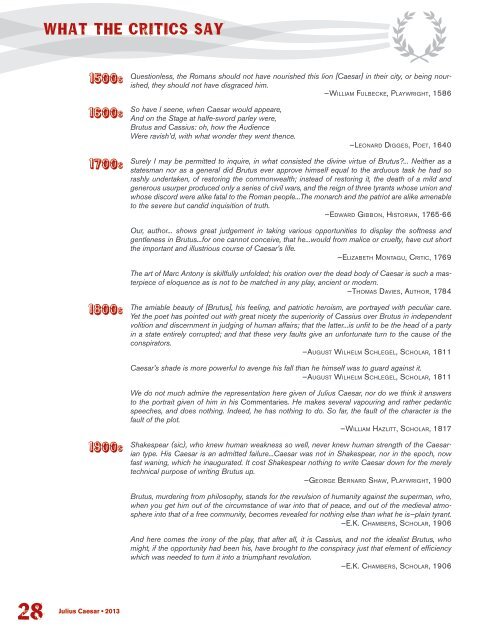Julius Caesar • 2013 - Chicago Shakespeare Theater
Julius Caesar • 2013 - Chicago Shakespeare Theater
Julius Caesar • 2013 - Chicago Shakespeare Theater
You also want an ePaper? Increase the reach of your titles
YUMPU automatically turns print PDFs into web optimized ePapers that Google loves.
28<br />
WHAT THE CRITICS SAY<br />
1500s<br />
1600s<br />
1700s<br />
1800s<br />
1900s<br />
<strong>Julius</strong> <strong>Caesar</strong> <strong>•</strong> <strong>2013</strong><br />
Questionless, the Romans should not have nourished this lion [<strong>Caesar</strong>] in their city, or being nourished,<br />
they should not have disgraced him.<br />
—William FulBeCke, playWriGhT, 1586<br />
So have I seene, when <strong>Caesar</strong> would appeare,<br />
And on the Stage at halfe-sword parley were,<br />
Brutus and Cassius: oh, how the Audience<br />
Were ravish’d, with what wonder they went thence.<br />
—leonarD DiGGes, poeT, 1640<br />
Surely I may be permitted to inquire, in what consisted the divine virtue of Brutus?... Neither as a<br />
statesman nor as a general did Brutus ever approve himself equal to the arduous task he had so<br />
rashly undertaken, of restoring the commonwealth; instead of restoring it, the death of a mild and<br />
generous usurper produced only a series of civil wars, and the reign of three tyrants whose union and<br />
whose discord were alike fatal to the Roman people...The monarch and the patriot are alike amenable<br />
to the severe but candid inquisition of truth.<br />
—eDWarD GiBBon, hisTorian, 1765-66<br />
Our, author... shows great judgement in taking various opportunities to display the softness and<br />
gentleness in Brutus...for one cannot conceive, that he...would from malice or cruelty, have cut short<br />
the important and illustrious course of <strong>Caesar</strong>’s life.<br />
—elizaBeTh monTaGu, CriTiC, 1769<br />
The art of Marc Antony is skillfully unfolded; his oration over the dead body of <strong>Caesar</strong> is such a masterpiece<br />
of eloquence as is not to be matched in any play, ancient or modern.<br />
—Thomas Davies, auThor, 1784<br />
The amiable beauty of [Brutus], his feeling, and patriotic heroism, are portrayed with peculiar care.<br />
Yet the poet has pointed out with great nicety the superiority of Cassius over Brutus in independent<br />
volition and discernment in judging of human affairs; that the latter...is unfit to be the head of a party<br />
in a state entirely corrupted; and that these very faults give an unfortunate turn to the cause of the<br />
conspirators.<br />
—auGusT Wilhelm sChleGel, sCholar, 1811<br />
<strong>Caesar</strong>’s shade is more powerful to avenge his fall than he himself was to guard against it.<br />
—auGusT Wilhelm sChleGel, sCholar, 1811<br />
We do not much admire the representation here given of <strong>Julius</strong> <strong>Caesar</strong>, nor do we think it answers<br />
to the portrait given of him in his Commentaries. He makes several vapouring and rather pedantic<br />
speeches, and does nothing. Indeed, he has nothing to do. So far, the fault of the character is the<br />
fault of the plot.<br />
—William hazliTT, sCholar, 1817<br />
Shakespear (sic), who knew human weakness so well, never knew human strength of the <strong>Caesar</strong>ian<br />
type. His <strong>Caesar</strong> is an admitted failure...<strong>Caesar</strong> was not in Shakespear, nor in the epoch, now<br />
fast waning, which he inaugurated. It cost Shakespear nothing to write <strong>Caesar</strong> down for the merely<br />
technical purpose of writing Brutus up.<br />
—GeorGe BernarD shaW, playWriGhT, 1900<br />
Brutus, murdering from philosophy, stands for the revulsion of humanity against the superman, who,<br />
when you get him out of the circumstance of war into that of peace, and out of the medieval atmosphere<br />
into that of a free community, becomes revealed for nothing else than what he is—plain tyrant.<br />
—e.k. ChamBers, sCholar, 1906<br />
And here comes the irony of the play, that after all, it is Cassius, and not the idealist Brutus, who<br />
might, if the opportunity had been his, have brought to the conspiracy just that element of efficiency<br />
which was needed to turn it into a triumphant revolution.<br />
—e.k. ChamBers, sCholar, 1906




